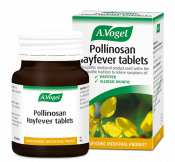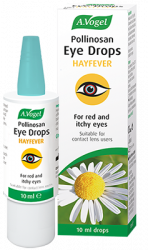Why do I have allergy symptoms if there is no pollen?
We know how frustrating it can be – all the pollen forecasts are saying low pollen all day, but you still can't stop sneezing! How can you possibly still be experiencing hayfever symptoms when there is no pollen in the air to react to?
Possible reasons for this are:
- Your immune system is on high alert
- There is pollen trapped in your home
- Your symptoms are triggered by another allergen
- The influence of weather.
The immune system is on high alert
When your body detects pollen, it triggers the release of histamine. This leads to symptoms including congestion and irritated skin.
These symptoms indicate that your body is in a state of high alert, and it can take time for these problems to subside once pollen levels have settled – it does not happen immediately.
This is most noticeable if you've just experienced a long stretch where pollen counts are very high, and it explains why we may experience hayfever symptoms when pollen counts begin to decline.
Check out my video below for more information on hayfever symptoms when pollen counts are low!
My self-care tip on the effect of pollution on hayfever symptoms
Pollution is a growing problem in towns and cities across the world but did you know this could have an impact on your hayfever symptoms? I explain more in my video below.
What can you do?
You can support your immune system naturally to help prevent it from over-reacting to pollen.
One of the best ways to support your immune system during hayfever season is to avoid histamine-containing foods. These include most aged or fermented foods, such as mature cheese, vinegar, sauerkraut or yoghurt. Alcohol is also rich in histamine!
Instead, try to eat some foods that are natural anti-histamines. These include garlic, ginger, blueberries, carrots and oranges – essentially, anything high in vitamin C or quercetin will be a huge help.
You should also try to avoid too much refined sugar, as this can trigger an adrenaline rush in the body, causing you to produce more histamine. Avoiding stress will also help to reduce this adrenaline rush, so make sure to take some time to relax and wind down.
For more on easing hayfever using diet, head to our hayfever and diet page.
Pollen trapped in the home
If you've been out and about during high pollen count days, it is likely that you will bring pollen back into your home on your clothes and in your hair. If you have pets, it's also quite likely that they will bring some in on their fur!
And what do people always recommend during hayfever season? 'Keep your windows shut!' In this case, keeping your windows shut might be a bad idea, since all it's doing is trapping pollen inside your home with you!
What can you do?
Stick any clothes that you've worn over the last few days in the wash. Clean your bed linen and have a general clean up and hoover.
Open a few windows to sweep pollen away and bring in some fresh air. It is best to do this late at night as pollen rises in the morning and falls in the evening. This means pollen is much easier to breathe in as it sweeps in through the windows at these times!
In the future, make sure to always get changed in the bathroom after coming home during high pollen count days. This ensures pollen doesn't spread through your home and, since many bathrooms come with extractor fans, pollen can be easily removed from this room. In addition, make sure to always wash your hair before going to bed so that you don't get pollen all over your pillow and sheets.
Other allergy triggers
If allergy symptoms regularly develop when pollen counts are low, it may indicate that pollen is not to blame. Other common allergens include animal dander, dust and mould.
It could be that your sensitivities have widened a little since last year, thus causing more of a reaction. So, have a think about whether any of these could be the cause of your symptoms and then you can begin to address them.
My Top Tip:

"I've been on prescription hayfever tablets for years but they haven't worked for 2 years. These work."

Weather changes
A mild winter can cause plants to pollinate a little earlier than normal. Although this only amounts to a very small amount of pollen in the air and, therefore, a low pollen count, it can still cause hayfever symptoms. This is particularly noticeable if you live in a town or city where pollution mixes with pollen to cause more severe symptoms.
What can you do?
To ease itchy, irritated eyes we'd recommend our Eyebright Eye Drops, which can be used while wearing contact lenses!
In addition, you may find that a herbal nasal spray is much gentler on your delicate nasal passages than a chemical one. Try our Pollinosan Nasal Spray, which helps to gently loosen congestion without causing irritation. It contains a similar complex of herbs as our Pollinosan tablets.
Finally, stay up-to-date with all the latest information on the pollen count in your area with our local pollen forecasts! Just type in your postcode and you will find details of tree, grass and weed pollen for the next 5 days.
Find your nearest local pollen forecast.
Originally published 11 July 2017 (updated 9 June 2020)




 Looking for relief of red and itchy eyes due to hayfever?
Looking for relief of red and itchy eyes due to hayfever?

